Gachino is a small river, but one of the key tributaries of the Meki River which trickles down the semi-mountainous Gurage Zone in Bui Woreda (district) to drain into the expansive freshwater Lake Ziway in Ethiopia’s Central Rift Valley.
Located 240 kilometres southwest of Addis Ababa, the Gurage landscape is a striking mix of rolling hills and fertile valleys. With the high altitude and favourable climate, agriculture is the backbone of Gurage economy. Farmers grow teff, maize, sorghum, ensete which is a false banana plant, and coffee among other crops. They also keep livestock, mainly cattle for milk and butter.
In recent years, however, the surrounding landscape has been exposed to uncontrolled human activities, leading to gradual degradation with Masenne Hill being the most affected. Tilahun Haile, a resident farmer and chair of one of the community associations in Bui, has seen this degradation unfold.
“Our elders in Adazer kebele (village) speak of a time when the land was covered in forests. With time, the forests disappeared. The land has now been destroyed by overgrazing and rampant deforestation for charcoal production,” he says.
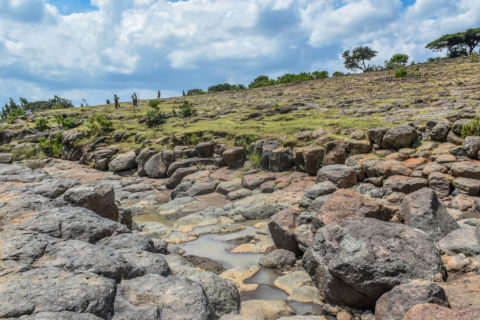
Milky waters of Gachino River flowing through the degraded hills of Bui
The degradation upstream has had severe consequences. Soil erosion in particular, has left some of the undulating hills rocky and bare. This in turn adversely impacted the water flow in the Gachino and other feeder rivers, and consequently the Meki River, one of the two major catchments for Lake Ziway. The reduced water volume is severely affecting fisheries, migratory birds, biodiversity in general and the livelihoods of thousands of people in the lowland wetlands of the Ziway-Shalla sub-basin.
Community Action and Nature-based Solutions
Recognising the severity of degradation, Wetlands International, in close collaboration with the regional government, local communities and Dutch partners developed a comprehensive strategy in 2020 to tackle these issues using a multi-pronged integrated approach to address upstream erosion, enhance water-efficient farming in downstream areas and improve water governance in the sub-basin.
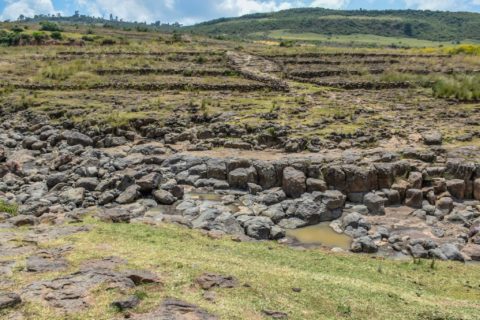
Hillsides of Adazer under restoration using stone bunds and other measures. Gachino River in the foreground
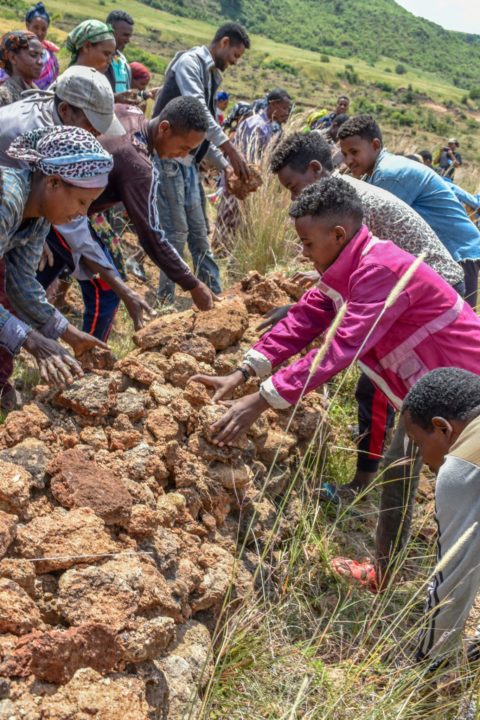
Building stone bunds to reduce soil erosion in uphill areas of Bui
The community members were registered in associations to help them work together on sustainable development activities. These included implementing measures to deter cattle from accessing the sites set aside for restoration and constructing terraces and other nature-based solutions to counter erosion and conserve water.
Five community-based associations, each comprising 36 dedicated members, are now engaged in restoration and livelihood activities with support from Ziway-Shalla Basin in Balance project. The initiative is enabling the farming community to exploit alternative income opportunities such as fattening goats for sale, keeping poultry for eggs, and diversified vegetable cultivation to sustainably boost household incomes and reduce human pressure on the land and forests.
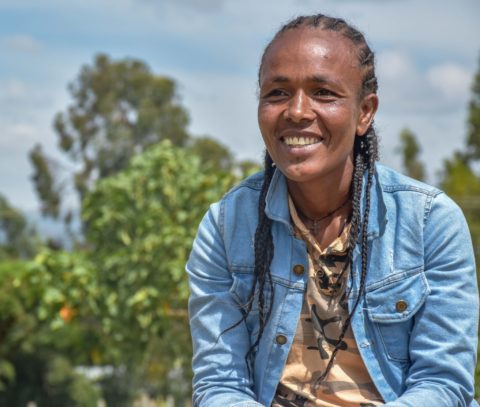
Etenesh Wolde
Etenesh Wolde is one of the remarkable community members leading the charge as a chair of one of the five associations. She reflects on the dramatic changes that have taken place:
“It’s been three years since I became part of this project. In the past, this area had become arid and scarcely recognizable from what it is today. Wetlands International came to us through the Woreda office and provided opportunities. We are now organised in associations and trained to build terraces and stone bunds to prevent soil erosion.”
“We are also engaged in knowledge-sharing exchange visits on soil and water management with neighbouring downstream villages. Through our concerted efforts, this once desolate land is recovering progressively,” adds Haile.
The two community leaders laud opportunities created by Wetlands International and the consortium partners to secure an additional income while simultaneously caring for the environment, but states that water scarcity remains a big challenge which, if addressed, would usher in development and improve the living conditions for the local community.
Enku Degu, an agriculture expert from the Soddo Woreda Office who is also the government focal point for the project, says the initiative is registering profound impacts on the ecosystem and the wellbeing of the community.
“This project, which is closely monitored by our office, is yielding good benefits. There is certainly better water management for the community, and agroforestry and improved crop production are helping to boost livelihoods and safeguard the ecosystem as well,” he says.
From the collective effort of the Bui community, local government and Wetlands International, more than 150 hectares of degraded land are under reclamation in the Gurage Zone. Grass cover and shrubs are regenerating, and the springs that had dried up are slowly coming to life. Enku believes lot more will be achieved if this level of stakeholder collaboration is sustained.
From charcoal producer to keen environmentalist
Further downstream in the vast plains of the central Rift Valley, a similar approach is driving the reclamation of degraded areas around Abijata-Shalla Lakes National Park.
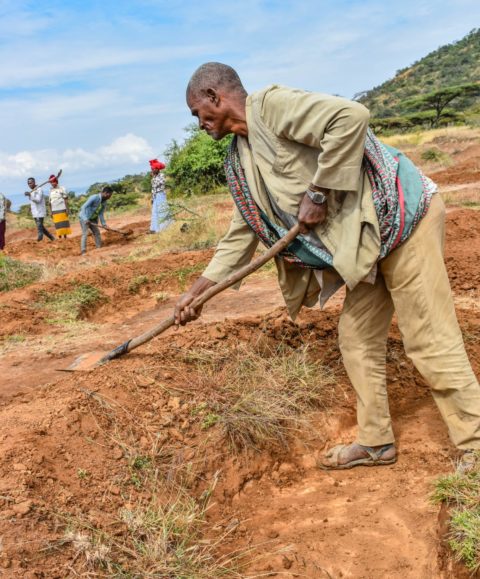
Gamadi Hami building an eyebrow at one of the watersheds in Abijata-Shalla Lakes National Park
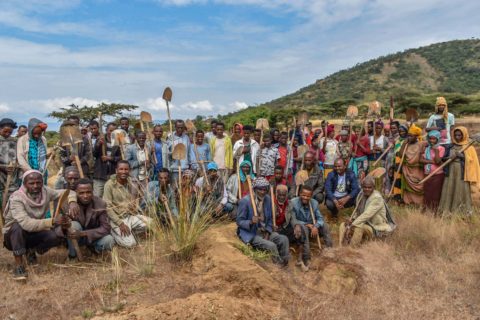
Mekane Fike Forest Protection Association after a day’s work of restoration
One of the community members involved is Gamadi Hami, 47, a reformed charcoal producer.
“For many years, I would cut trees by the dozens in this area to produce charcoal to feed my wife and 10 children. Each sack would fetch 100 Birr. But with time, I witnessed the degradation firsthand and decided to join the Mekane Fike Forest Protection Association and stop dealing in charcoal.”
Working in collaboration with the regional (zonal) government and local administration, Wetlands International has facilitated the establishment of eleven community-based organisations such as Mekane Fike Forest Protection Association (one CBO per watershed) to spearhead conservation efforts within the sub-basin. Currently, more than 2,500 (1,836 men and 664 women) unemployed youths are engaged in the restoration of 3,301 ha of degraded land, through nature-based restoration measures such as eyebrow basins, half-moons, trenches, stone and soil bunds, hillside terraces, check dams among others.
Further, supporting these communities with complementary alternative livelihood opportunities minimises their dependence on natural resources such as forests and forest products in riverine and lacustrine environments.
Dr Abdullaah Beekaa Aliyyii, who is Head of Agriculture in West Arsi Zone of Oromia State, believes communities are aware of the linkages between their actions and the impact on the environment and that destructive activities can be reduced or stopped altogether.
“It’s tough but possible to change activities such as charcoal burning, although this will take time to wipe out. Sand mining for construction has fortunately been stopped. For restoration to succeed, community members need both short and mid-term income-generating activities. They also require capacity-building and training, and regular follow-up and support from implementing and relevant government agencies and other stakeholders,” he says.
The positive changes in the upstream areas of the Gurage community and the Gachino River to the downstream central Rift Valley and South Omo by the Source to Sea initiative and other past projects are a beacon of hope that are transforming landscapes and lives. They inspire more communities to work together to protect and restore their precious wetlands and to seek complementary alternative livelihood activities that improve their wellbeing without placing the environment and their livelihoods in peril.

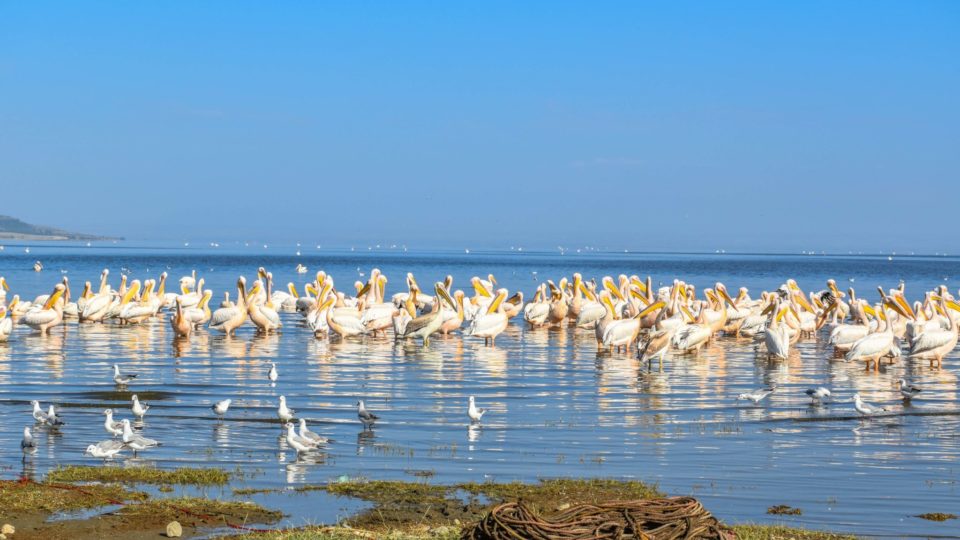
Leave a comment